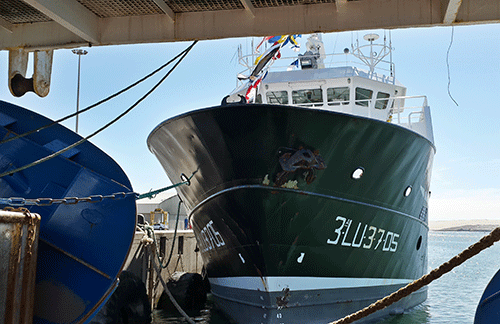The National Fishing Corporation of Namibia (Fishcor) has provided clarity on deals for an allocated 17 600 metric tonnes (mt) horse mackerel quota for the 2023 fishing season.
The State-owned holding company embroiled in the midst of the ongoing Fishrot scandal also categorically denied that a former general manager of finance resigned as a result of disagreeing with intricacies of the deals in question.
Fishcor this week stated it’s well-aware of its tainted past, and assured the public that it is in the process of business transformation, premised on standards of high ethical and professional conduct.
This approach, stated Group Chief Executive Officer Alex Gawanab in a media release issued this week, is seeing the company embark intentionally on a clean and transparent operational model.
“Fishcor takes its public accountability role very seriously, hence would like to set the record straight, and in so doing avoid its dealings to be misconstrued,” he added in relation to recent media reports.
In a lengthy statement, Gawanab explained how Fischor’s commitment to pay former Seaflower Pelagic Processing employees an unemployment relief grant for 1 June 2022 to 31 December 2022 resulted in the engagement of Venmar Fishing. The latter agreed to pay the grants in advance in exchange for an allocation of 6205 mt of Fishcor’s quota for the 2023 fishing season.
Following a number of developments, Fishcor management took a decision to participate in the full value chain of the horse mackerel pipeline by catching, landing, marketing and selling the remainder of its own quota.
“To this end, Fishcor’s board agreed to a framework presented by management that would maximise the income for the company, while taking cognisance of previous pitfalls whereby Fishcor took minority shareholding without clear visibility of the market, which led to the exploitation of the company through potential transfer pricing,” he stated.
Following the assessment of various joint venture proposals,
Fishcor management was given the go- ahead to engage Mabasen Fishing in a catching, landing and marketing agreement
Gawanab said Mabasen undertook to provide risk capital upfront to fund the mobilisation of vessels, and to facilitate the catching of the fish due to cash-flow and horse mackerel fishing knowledge limitations at Fishcor.
“Mabasen, with their market access, was also given the right to market the fish in their established markets at a market-related commission (percentage), which is also stipulated in the agreement. Each vessel is earmarked to employ a minimum of 34 Namibian seamen,” Gawanab continued.
Fishcor has likewise taken note of concerns expressed regarding the Mabasen deal, and assured the public that Fishcor has gone through a rigorous due diligence process to obtain approval from its board of directors.
“In addition, the line Ministry of Finance and Public Enterprises has been apprised on the deal. Fishcor believes it is the best revenue-driver in the short-term without committing the company to long-term quota arrangements which have the potential of exposing the company to undue risk. It is regrettable and unfortunate, but in the interest of public accountability, Fishcor is now forced to reveal the terms of the unique value proposition of one of their contestants in the race to partner with Fishcor,” Gawanab said.
Fishcor was founded in December 1991 in accordance with the National Fishing Corporation of Namibia Act, which paved the way for the establishment of the subsidiaries Seaflower Lobster Corporation Ltd and Seaflower Whitefish Corporation Ltd.
In the Fishrot scandal, a number of prominent politicians and businessmen are accused of running schemes to control valuable fishing quotas. It is alleged that they then diverted these quotas to an Icelandic fishing company in return for kickbacks.



